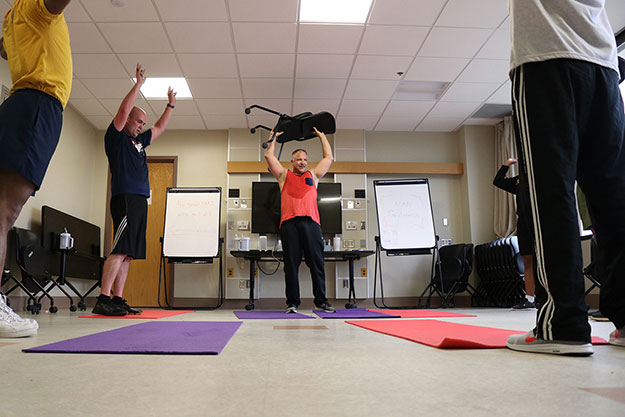Editor's note: This is the first of a two-part story. Part two will run in next week's paper.
What does it take to get on track when life's trials have led to the misuse of alcohol and other substances? The answer to that question is likely as varied as people themselves. For some, a 28-day stay in Madigan's Residential Treatment Facility (RTF) aids in altering patterns of thinking and quells destructive behavior.
The RTF at Madigan was developed three-and-a-half years ago to provide a final stop for servicemembers who need intensive, inpatient treatment to battle their reliance on substances.
 "What separates our program is, when other programs address substance use issues, they address the symptom of substance use. Our program looks at the core of it," explained unit psychologist Dr. Julie Oberhausen.
"What separates our program is, when other programs address substance use issues, they address the symptom of substance use. Our program looks at the core of it," explained unit psychologist Dr. Julie Oberhausen.
How did the RTF become the distinctive program that it is?
Impetus and expertise
A major reason for the establishment of a residential treatment program on Joint Base Lewis-McChord was that sending servicemembers to external facilities in the TRICARE network was costing $2 to $3 million per year. Madigan's residential treatment facility is one of only three in the Army and six total in the Department of Defense.
The first RTF at Fort Gordon, Georgia, was established a half dozen years ago and provided the model for Madigan's. Since Madigan's RTF started at the beginning of 2016, it has seen changes to its staff and curriculum.
"The program is entirely evidence-based now and follows the clinical guidelines of both the DoD and the VA," said Richard Benson, a social worker with the program.
"Our providers are all licensed and have specialties in addiction, which is nice because we all speak the same language and have the same experience," Benson added.
He noted the only exception in licensure among providers is the psychologist who does have years of experience with addiction treatment.
The program's staff consists of providers to include a psychologist, therapists and a social worker and nursing staff that includes psychiatric technicians like Linus Agu, who has been with the program since its inception.
Agu has two master's degrees and an associate license to be a family therapist. He is not unusual for the staff who are well-educated and highly invested in the psychiatric field.
That expertise is needed as residential treatment provides the highest level of care for substance use disorder and requires referral and the involvement of the servicemember's command.
This program will help keep some people in their military careers, while others will be separated from service. Either way, set up for future success is the overriding goal of the program, said Benson.
Unique with a purpose
Madigan's program is different from most RTFs to be found both within the military and outside it.
One of the aspects of the RTF that is unique is its autobiography. Other programs do have this element where patients come into the program and tell their story of substance misuse. But the RTF here delves deeper by adding a process group after the initial autobiography session.
When asked for a highlight of the program for them in an exit survey upon graduation, one patient described it as useful because of, "The very nature of the autobiography and its complex dynamic. Thought processes, beliefs, and childhood trauma are presented in such a manner that necessitates rigorous honesty and authenticity. Not only does it ‘break the ice' of sharing uncomfortable memories and feelings with strangers, it allows other patients the ability to see patterns of misrepresentation of past experience as well as allows them to think and question the information being presented in an insightfully critical manner."
Oberhausen breaks it down as autobiography is the identification and process is the examination.
"It's pretty intensive. There is fear leading into it, distress during it, and relief following it, with understanding," she said.
She guides the group through these sessions with the assistance of techs and sometimes nurses. It is the techs who are the patient's go-to person on the program staff.
Each day every patient has a tech assigned to them. They have heavy interaction with the patients, for whom they advocate and act as sounding boards and assistants for all their needs. As Agu described it, the techs are, "in the trenches with the patients."
One of their functions is to accompany the patients on outings. They have gone all around the Puget Sound visiting all sorts of settings from nature trails to farmers markets. They also engage in various community volunteer projects. Importantly, they also attend Alcoholics Anonymous meetings in a variety of communities to give the patients a flavor of the different groups they can find.
"These outings are not just for fun; there is purposefulness behind it. In part, to help reintegrate the soldier into social settings without alcohol or drugs," said Dr. Aaron Edwards, a psychiatrist and the program's medical director.
Photo: Dr. Aaron Edwards (center), a psychiatrist and medical director, goes the extra mile to inspire as he and Barry Greenwood, a marriage and family therapist in Madigan Army Medical Center’s Residential Treatment Facility on JBLM, lead a rigorous workout for patients May 28.





Read Comments